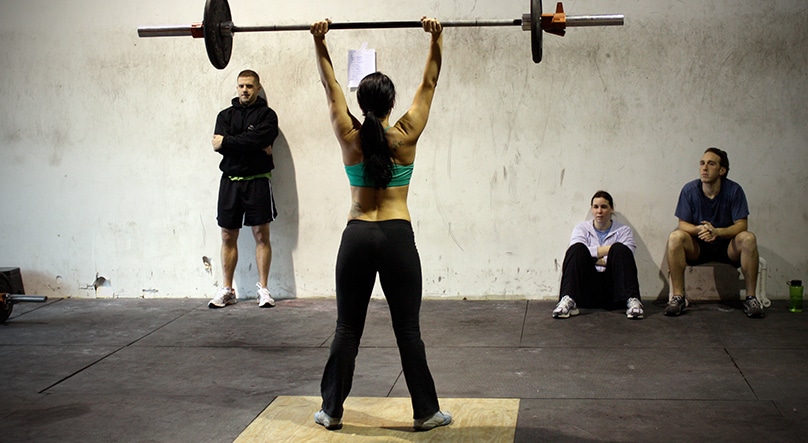For the high-level CrossFit athlete, RX’ing a WOD is usually a foregone conclusion. Conversely, a CrossFit newbie will scale a workout down to ensure that they can actually perform the movements and do the work. But what about the athlete ‘in the middle’? The individual who has a good chunk of CrossFit experience under their belt, but is not at the level where they know that whatever turns up on the whiteboard, they are going to RX the shit out of it. For many of us, the question simply becomes: when should I RX a WOD, and when should I scale it? Essentially, it comes down to a few key factors:
Intensity/Purpose of the WOD
One could argue that the intensity with which you can perform the workout as it’s intended is the determining factor for when to scale or when to RX. Far too often people get hung up about the idea of going RX as the goal of the workout, when that’s simply not the case. Remember when you used to spend an hour at the globo gym, waiting for a certain machine to be available or trudging along on the treadmill for the majority of time? Compare that to a brutal 12-minute WOD at the box. Which was more effective? The same concept applies within CrossFit. There’s a reason workouts can be scored through time, rounds, weights and reps. You are expected to push yourself to your limits to achieve a score that you can always improve upon.
Let’s take the infamous “Fran” as an example. Everyone wants to test themselves with Fran by doing it as prescribed—21/15/9 reps for time of thrusters and pull-ups at 95lbs for the guys, 65lbs for the gals. The best CrossFitters in the world can do this workout in around 2 minutes. The purpose of the workout is to be a sprint, to achieve that metcon burn that will leave you on the ground, gasping for air. As such, you need to choose a weight that is appropriate. There is no point in going RX with Fran if you are going to be spending just as much time resting as you are working. Doing Fran with an RX weight is a great accomplishment, but if you’re taking 15 minutes or longer to do it then you’ve missed the point of the workout—you’ve lowered the intensity, and you certainly won’t be on the floor at the end of it (side note: collapsing on the floor covered in sweat coughing up phlegm and wondering what just happened is always a good sign that you’ve picked scaled appropriately).
A lot of times people want to ‘go heavy’ in workouts in order to build up their strength. This may be done with good intent, but it’s important to remember that there is a specific strength portion of the class, where you find your 1RM, 3RM etc. before you head into the metcon. You won’t be able to perform a WOD at high intensity with a prescribed weight if you don’t have the necessary strength to move it consistently, and I got news for ya—that strength isn’t going to come from doing that WOD again and again and again.
On the other hand, you may be flying through the workout in 3 minutes with a scaled weight, and though it may be tough, it’s not quite challenging enough. Yet you feel that moving up to RX would slow you down considerably and add 5 minutes to your time—you know who you are. Well, there’s only one way to find out! I assure you, if you’re only 10 pounds away from the RX weight, that’s not going to happen—you’d be surprised at the time you will achieve.
Safety/Consistency with the movements
The other crucial issue to take into consideration when debating between RX and scaled is safety. You may have hit a muscle-up or two in practice, but if the workout calls for 10 each round, is it really smart to try and keep throwing yourself up on to those rings? Should you really be throwing that kettlebell over your head repeatedly if you can only do a few reps at good form? Sometimes, it’s natural for an athlete’s form to break down in a workout as they start to fatigue. Trust me, I understand that feeling when you just say to yourself, “Screw it, I’m racing the clock and I’m go to finish THIS WOD with THIS WEIGHT and no ones going to stop me.” I applaud your courage CrossFitter. We all have that competitive drive to do our best, but at what risk? You want to challenge yourself, but at the end of the day it’s important that you can leave the box under your own power and come back the next day for more. Moving heavy weight inefficiently and inconsistently for repeated reps just to say you did RX is asking for trouble, and it feeds the CrossFit trolls when you invariably get hurt. Don’t feed the trolls, people.
It can’t be said enough that you have to check your ego when you step into the box. It doesn’t matter if every other person is always doing RX (that would be a gym full of freaks anyway), you have to tailor the workout to you. If that means dropping some weight or throwing a band on the pull-up bar, so be it! Conversely, there’s nothing wrong with being a ‘specific RX’er’—picking and choosing the movements and WODs where you can go RX, and when you have to scale down. But when you do, always remember that the workout should be INTENSE AND SAFE. You are the one who’ll decide if that’s going to be the case.
Photo by Amanda Karnes/CC BY-NC-ND 2.0
















I agree, you should only do RX when you feel confident and are able to complete the workout within a reasonable time and intensity. However, lately I’ve been experiencing this among other examples sadly.
What if your coach tells you to stop being a pussy and basically continues to mock you until use that 32kg KB instead of the 24kg. Regardless of any back or confidence complaints… Time for a new coach?
This is great! If you ever wonder whether or not you should be scaling (or even going above RX) check out the WODRight iPhone app. I started using it ALL THE TIME. It’ll calculate what weight you need to use based on your 1 rep maxes and skill level.
@Luke. If your coach MOCKS you at all – time for a new coach.